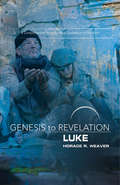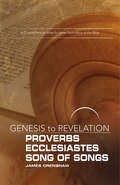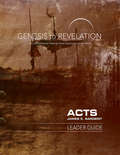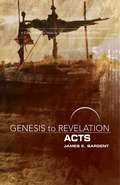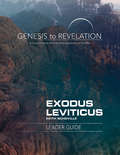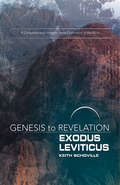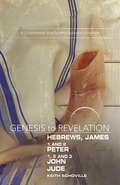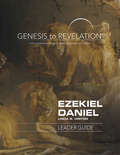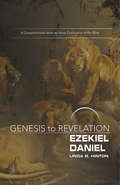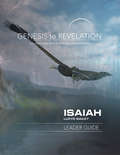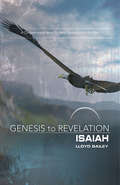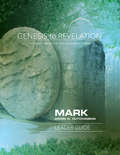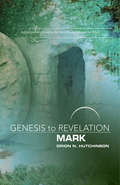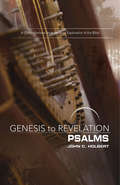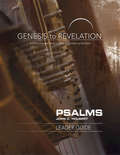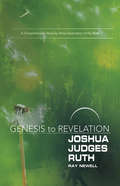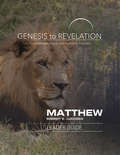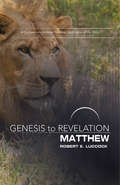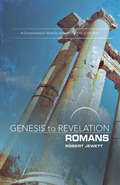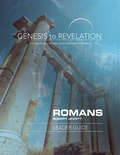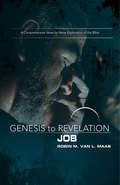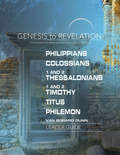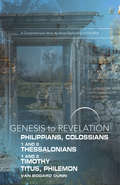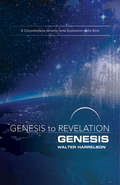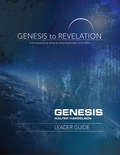- Table View
- List View
Genesis to Revelation: A Comprehensive Verse-by-Verse Exploration of the Bible (Genesis to Revelation series)
by Horace R. WeaverStudy the entire Book of Luke, beginning with a review of Jesus’ birth and boyhood and ending with him experiencing Calvary and resurrection. Some of the major ideas explored are: keys to Jesus public ministry, Jesus being recognized as the Messiah, the life of discipleship, use and abuse of power, and Jesus’s response to difficult questions.More than 3.5 million copies of the series have been sold.This revision of the Abingdon classic Genesis to Revelation Series is a comprehensive, verse-by-verse, book-by-book study of the Bible based on the NIV. These studies help readers strengthen their understanding and appreciation of the Bible by enabling them to engage the Scripture on three levels: What does the Bible say? Questions to consider while reading the passage for each session. What does the passage mean? Unpacks key verses in the selected passage. How does the Scripture relate to my life? Provides three major ideas that have meaning for our lives today. The meaning of the selected passages are made clear by considering such aspects as ancient customs, locations of places, and the meanings of words.The meaning of the selected passages are made clear by considering such aspects as ancient customs, locations of places, and the meanings of words. The simple format makes the study easy to use. Includes maps and glossary with key pronunciation helps.Updates will include: New cover designs. New interior designs. Leader Guide per matching Participant Book (rather than multiple volumes in one book). Updated to 2011 revision of the New International Version Translation (NIV). Updated references to New Interpreters Dictionary of the Bible. Include biblical chapters on the contents page beside session lesson titles for at-a-glance overview of biblical structure. Include larger divisions within the contents page to reflect macro-structure of each biblical book. Ex: Genesis 1-11; Genesis 12-50; Exodus 1-15; Exodus 16-40; Isaiah 1-39; Isaiah 40-66.The simple format makes the study easy to use. Each volume is 13 sessions and has a separate leader guide.
Genesis to Revelation: A Comprehensive Verse-by-Verse Exploration of the Bible (Genesis to Revelation series)
by James CrenshawWhat does the Bible say? What does it mean? How does it relate to my life? Genesis to Revelation, a comprehensive, verse-by-verse, book-by-book study of the Bible, will strengthen your understanding and appreciation of the Scripture by helping you engage on these three levels. Newly revised, these Abingdon classics are based on the NIV translation and are presented in an easy-to-read format. Each of the volumes includes thirteen sessions and a separate Leader Guide.Study the entire Books of Proverbs, Ecclesiastes, and Song of Songs in this comprehensive study beginning with a look at the springs of life in Proverbs and ending with Song of Songs' declaration that love is as strong as death. Some of the major ideas explored in this study are: the cost of getting involved, joy unlimited, the constancy of friendship, time to love and to hate, and the old and the new. The meaning of the selected passages is made clear by considering such aspects as ancient customs, locations of places, and the meanings of words. The simple format makes the study easy to use. Includes maps and glossary with key pronunciation helps.
Genesis to Revelation: A Comprehensive Verse-by-Verse Exploration of the Bible (Genesis to Revelation series)
by James E. SargentStudy the entire Book of Acts in this comprehensive 13-session study, beginning with the mission to the world and ending with Paul's journey to Rome. Some of the major ideas explored are: a Gospel that cannot be contained, divine initiative and human responsibility, the subtle work of the Holy Spirit, what holds us together, and the plight oftheology in a cynical world.Leader Guide includes: A verse-by-verse, in-depth look at the Scriptures. Background material, including word studies and history of the biblical setting. Answers to questions asked in the Participant Book. Application of the Scripture to daily life situations. Discussion suggestions. A variety of study options. Practical tips for leaders to use.More than 3.5 million copies of the series have been sold.This revision of the Abingdon classic Genesis to Revelation Series is a comprehensive, verse-by-verse, book-by-book study of the Bible based on the NIV. These studies help readers strengthen their understanding and appreciation of the Bible by enabling them to engage the Scripture on three levels: What does the Bible say? Questions to consider while reading the passage for each session. What does the passage mean? Unpacks key verses in the selected passage. How does the Scripture relate to my life? Provides three major ideas that have meaning for our lives today. The meaning of the selected passages are made clear by considering such aspects as ancient customs, locations of places, and the meanings of words.The meaning of the selected passages are made clear by considering such aspects as ancient customs, locations of places, and the meanings of words. The simple format makes the study easy to use. Includes maps and glossary with key pronunciation helps.Updates will include: New cover designs. New interior designs. Leader Guide per matching Participant Book (rather than multiple volumes in one book). Updated to 2011 revision of the New International Version Translation (NIV). Updated references to New Interpreters Dictionary of the Bible. Include biblical chapters on the contents page beside session lesson titles for at-a-glance overview of biblical structure. Include larger divisions within the contents page to reflect macro-structure of each biblical book. Ex: Genesis 1-11; Genesis 12-50; Exodus 1-15; Exodus 16-40; Isaiah 1-39; Isaiah 40-66.The simple format makes the study easy to use. Each volume is 13 sessions.
Genesis to Revelation: A Comprehensive Verse-by-Verse Exploration of the Bible (Genesis to Revelation series)
by James E. SargentStudy the entire Book of Acts in this comprehensive 13-session study, beginning with the mission to the world and ending with Paul's journey to Rome. Some of the major ideas explored are: a Gospel that cannot be contained, divine initiative and human responsibility, the subtle work of the Holy Spirit, what holds us together, and the plight oftheology in a cynical world.More than 3.5 million copies of the series have been sold.This revision of the Abingdon classic Genesis to Revelation Series is a comprehensive, verse-by-verse, book-by-book study of the Bible based on the NIV. These studies help readers strengthen their understanding and appreciation of the Bible by enabling them to engage the Scripture on three levels: What does the Bible say? Questions to consider while reading the passage for each session. What does the passage mean? Unpacks key verses in the selected passage. How does the Scripture relate to my life? Provides three major ideas that have meaning for our lives today. The meaning of the selected passages are made clear by considering such aspects as ancient customs, locations of places, and the meanings of words.The meaning of the selected passages are made clear by considering such aspects as ancient customs, locations of places, and the meanings of words. The simple format makes the study easy to use. Includes maps and glossary with key pronunciation helps.Updates will include: New cover designs. New interior designs. Leader Guide per matching Participant Book (rather than multiple volumes in one book). Updated to 2011 revision of the New International Version Translation (NIV). Updated references to New Interpreters Dictionary of the Bible. Include biblical chapters on the contents page beside session lesson titles for at-a-glance overview of biblical structure. Include larger divisions within the contents page to reflect macro-structure of each biblical book. Ex: Genesis 1-11; Genesis 12-50; Exodus 1-15; Exodus 16-40; Isaiah 1-39; Isaiah 40-66.The simple format makes the study easy to use. Each volume is 13 sessions and has a separate leader guide.
Genesis to Revelation: A Comprehensive Verse-by-Verse Exploration of the Bible (Genesis to Revelation series)
by Keith SchovilleStudy the Books of Exodus and Leviticus, beginning with Moses’s story and ending with the priests and their duties. Some of the major ideas explored are: Passover and exodus, covenant laws, instructions carried out, worship and laws.Leader Guide includes: A verse-by-verse, in-depth look at the Scriptures. Background material, including word studies and history of the biblical setting. Answers to questions asked in the Participant Book. Application of the Scripture to daily life situations. Discussion suggestions. A variety of study options. Practical tips for leaders to use.More than 3.5 million copies of the series have been sold.This revision of the Abingdon classic Genesis to Revelation Series is a comprehensive, verse-by-verse, book-by-book study of the Bible based on the NIV. These studies help readers strengthen their understanding and appreciation of the Bible by enabling them to engage the Scripture on three levels: What does the Bible say? Questions to consider while reading the passage for each session. What does the passage mean? Unpacks key verses in the selected passage. How does the Scripture relate to my life? Provides three major ideas that have meaning for our lives today. The meaning of the selected passages are made clear by considering such aspects as ancient customs, locations of places, and the meanings of words.The meaning of the selected passages are made clear by considering such aspects as ancient customs, locations of places, and the meanings of words. The simple format makes the study easy to use. Includes maps and glossary with key pronunciation helps.Updates will include: New cover designs. New interior designs. Leader Guide per matching Participant Book (rather than multiple volumes in one book). Updated to 2011 revision of the New International Version Translation (NIV). Updated references to New Interpreters Dictionary of the Bible. Include biblical chapters on the contents page beside session lesson titles for at-a-glance overview of biblical structure. Include larger divisions within the contents page to reflect macro-structure of each biblical book. Ex: Genesis 1-11; Genesis 12-50; Exodus 1-15; Exodus 16-40; Isaiah 1-39; Isaiah 40-66.The simple format makes the study easy to use. Each volume is 13 sessions.
Genesis to Revelation: A Comprehensive Verse-by-Verse Exploration of the Bible (Genesis to Revelation series)
by Keith SchovilleStudy the Books of Exodus and Leviticus, beginning with Moses’s story and ending with the priests and their duties. Some of the major ideas explored are: Passover and exodus, covenant laws, instructions carried out, worship and laws.More than 3.5 million copies of the series have been sold.This revision of the Abingdon classic Genesis to Revelation Series is a comprehensive, verse-by-verse, book-by-book study of the Bible based on the NIV. These studies help readers strengthen their understanding and appreciation of the Bible by enabling them to engage the Scripture on three levels: What does the Bible say? Questions to consider while reading the passage for each session. What does the passage mean? Unpacks key verses in the selected passage. How does the Scripture relate to my life? Provides three major ideas that have meaning for our lives today. The meaning of the selected passages are made clear by considering such aspects as ancient customs, locations of places, and the meanings of words.The meaning of the selected passages are made clear by considering such aspects as ancient customs, locations of places, and the meanings of words. The simple format makes the study easy to use. Includes maps and glossary with key pronunciation helps.Updates will include: New cover designs. New interior designs. Leader Guide per matching Participant Book (rather than multiple volumes in one book). Updated to 2011 revision of the New International Version Translation (NIV). Updated references to New Interpreters Dictionary of the Bible. Include biblical chapters on the contents page beside session lesson titles for at-a-glance overview of biblical structure. Include larger divisions within the contents page to reflect macro-structure of each biblical book. Ex: Genesis 1-11; Genesis 12-50; Exodus 1-15; Exodus 16-40; Isaiah 1-39; Isaiah 40-66.The simple format makes the study easy to use. Each volume is 13 sessions and has a separate leader guide.
Genesis to Revelation: A Comprehensive Verse-by-Verse Exploration of the Bible (Genesis to Revelation series)
by Keith SchovilleStudy the entire books of Hebrews; James; First and Second Peter; First, Second, and Third John; and Jude, including the uniqueness of God's final revelation for the salvation of the people, essential instruction in the faith, strengthening faith in the midst of the difficulties of life, faith and works, fellowship with God and with other believers, encouragement to be ruled by love, and the spiritual health of the church. Some of the major ideas explored are: developing a personal relationship with Christ; running the race of life; your Christian experience; your influence in the life of your church; Jesus as a historical person; the second coming of Christ; and Christian hospitality.More than 3.5 million copies of the series have been sold.This revision of the Abingdon classic Genesis to Revelation Series is a comprehensive, verse-by-verse, book-by-book study of the Bible based on the NIV. These studies help readers strengthen their understandingand appreciation of the Bible by enabling them to engage the Scripture on three levels: What does the Bible say? Questions to consider while reading the passage for each session. What does the passage mean? Unpacks key verses in the selected passage. How does the Scripture relate to my life? Provides three major ideas that have meaning for our lives today. The meaning of the selected passages are made clear by considering such aspects as ancient customs, locations of places, and the meanings of words. The simple format makes the study easy to use.Updates will include: New cover designs. New interior designs. Leader Guide per matching Participant Book (rather than multiple volumes in one book). Updated to 2011 revision of the New International Version Translation (NIV). Updated references to New Interpreters Dictionary of the Bible. Include biblical chapters on the contents page beside session lesson titles for at-a-glance overview of biblical structure.The simple format makes the study easy to use. Each volume is 13 sessions and has a separate leader guide.
Genesis to Revelation: A Comprehensive Verse-by-Verse Exploration of the Bible (Genesis to Revelation series)
by Linda B. HintonStudy the books of Ezekiel and Daniel, beginning with Ezekiel’s story, and then moving on to tell Daniel’s story. Some of the major ideas explored are: learning of God, obedience to God, false prophecy, cleansing and renewal, Godly wisdom, and the endtime and meantime.Leader Guide includes: A verse-by-verse, in-depth look at the Scriptures. Background material, including word studies and history of the biblical setting. Answers to questions asked in the Participant Book. Application of the Scripture to daily life situations. Discussion suggestions. A variety of study options. Practical tips for leaders to use.More than 3.5 million copies of the series have been sold.This revision of the Abingdon classic Genesis to Revelation Series is a comprehensive, verse-by-verse, book-by-book study of the Bible based on the NIV. These studies help readers strengthen their understanding and appreciation of the Bible by enabling them to engage the Scripture on three levels: What does the Bible say? Questions to consider while reading the passage for each session. What does the passage mean? Unpacks key verses in the selected passage. How does the Scripture relate to my life? Provides three major ideas that have meaning for our lives today. The meaning of the selected passages are made clear by considering such aspects as ancient customs, locations of places, and the meanings of words.The meaning of the selected passages are made clear by considering such aspects as ancient customs, locations of places, and the meanings of words. The simple format makes the study easy to use. Includes maps and glossary with key pronunciation helps.Updates will include: New cover designs. New interior designs. Leader Guide per matching Participant Book (rather than multiple volumes in one book). Updated to 2011 revision of the New International Version Translation (NIV). Updated references to New Interpreters Dictionary of the Bible. Include biblical chapters on the contents page beside session lesson titles for at-a-glance overview of biblical structure. Include larger divisions within the contents page to reflect macro-structure of each biblical book. Ex: Genesis 1-11; Genesis 12-50; Exodus 1-15; Exodus 16-40; Isaiah 1-39; Isaiah 40-66.The simple format makes the study easy to use. Each volume is 13 sessions.
Genesis to Revelation: A Comprehensive Verse-by-Verse Exploration of the Bible (Genesis to Revelation series)
by Linda B. HintonStudy the books of Ezekiel and Daniel, beginning with Ezekiel’s story, and then moving on to tell Daniel’s story. Some of the major ideas explored are: learning of God, obedience to God, false prophecy, cleansing and renewal, Godly wisdom, and the endtime and meantime.More than 3.5 million copies of the series have been sold.This revision of the Abingdon classic Genesis to Revelation Series is a comprehensive, verse-by-verse, book-by-book study of the Bible based on the NIV. These studies help readers strengthen their understanding and appreciation of the Bible by enabling them to engage the Scripture on three levels: What does the Bible say? Questions to consider while reading the passage for each session. What does the passage mean? Unpacks key verses in the selected passage. How does the Scripture relate to my life? Provides three major ideas that have meaning for our lives today. The meaning of the selected passages are made clear by considering such aspects as ancient customs, locations of places, and the meanings of words.The meaning of the selected passages are made clear by considering such aspects as ancient customs, locations of places, and the meanings of words. The simple format makes the study easy to use. Includes maps and glossary with key pronunciation helps.Updates will include: New cover designs. New interior designs. Leader Guide per matching Participant Book (rather than multiple volumes in one book). Updated to 2011 revision of the New International Version Translation (NIV). Updated references to New Interpreters Dictionary of the Bible. Include biblical chapters on the contents page beside session lesson titles for at-a-glance overview of biblical structure. Include larger divisions within the contents page to reflect macro-structure of each biblical book. Ex: Genesis 1-11; Genesis 12-50; Exodus 1-15; Exodus 16-40; Isaiah 1-39; Isaiah 40-66.The simple format makes the study easy to use. Each volume is 13 sessions and has a separate leader guide.
Genesis to Revelation: A Comprehensive Verse-by-Verse Exploration of the Bible (Genesis to Revelation series)
by Lloyd BaileyStudy the Book of Isaiah, beginning with the oracles against Judah and ending with a vision of the New Jerusalem. Some of the major ideas explored are: ingratitude of the blessed, a golden age, who is God, authorship, what is God like, and Utopia.Leader Guide includes: A verse-by-verse, in-depth look at the Scriptures. Background material, including word studies and history of the biblical setting. Answers to questions asked in the Participant Book. Application of the Scripture to daily life situations. Discussion suggestions. A variety of study options. Practical tips for leaders to use.More than 3.5 million copies of the series have been sold.This revision of the Abingdon classic Genesis to Revelation Series is a comprehensive, verse-by-verse, book-by-book study of the Bible based on the NIV. These studies help readers strengthen their understanding and appreciation of the Bible by enabling them to engage the Scripture on three levels: What does the Bible say? Questions to consider while reading the passage for each session. What does the passage mean? Unpacks key verses in the selected passage. How does the Scripture relate to my life? Provides three major ideas that have meaning for our lives today. The meaning of the selected passages are made clear by considering such aspects as ancient customs, locations of places, and the meanings of words.The meaning of the selected passages are made clear by considering such aspects as ancient customs, locations of places, and the meanings of words. The simple format makes the study easy to use. Includes maps and glossary with key pronunciation helps.Updates will include: New cover designs. New interior designs. Leader Guide per matching Participant Book (rather than multiple volumes in one book). Updated to 2011 revision of the New International Version Translation (NIV). Updated references to New Interpreters Dictionary of the Bible. Include biblical chapters on the contents page beside session lesson titles for at-a-glance overview of biblical structure. Include larger divisions within the contents page to reflect macro-structure of each biblical book. Ex: Genesis 1-11; Genesis 12-50; Exodus 1-15; Exodus 16-40; Isaiah 1-39; Isaiah 40-66.The simple format makes the study easy to use. Each volume is 13 sessions.
Genesis to Revelation: A Comprehensive Verse-by-Verse Exploration of the Bible (Genesis to Revelation series)
by Lloyd BaileyStudy the Book of Isaiah, beginning with the oracles against Judah and ending with a vision of the New Jerusalem. Some of the major ideas explored are: ingratitude of the blessed, a golden age, who is God, authorship, what is God like, and Utopia.More than 3.5 million copies of the series have been sold.This revision of the Abingdon classic Genesis to Revelation Series is a comprehensive, verse-by-verse, book-by-book study of the Bible based on the NIV. These studies help readers strengthen their understanding and appreciation of the Bible by enabling them to engage the Scripture on three levels: What does the Bible say? Questions to consider while reading the passage for each session. What does the passage mean? Unpacks key verses in the selected passage. How does the Scripture relate to my life? Provides three major ideas that have meaning for our lives today. The meaning of the selected passages are made clear by considering such aspects as ancient customs, locations of places, and the meanings of words.The meaning of the selected passages are made clear by considering such aspects as ancient customs, locations of places, and the meanings of words. The simple format makes the study easy to use. Includes maps and glossary with key pronunciation helps.Updates will include: New cover designs. New interior designs. Leader Guide per matching Participant Book (rather than multiple volumes in one book). Updated to 2011 revision of the New International Version Translation (NIV). Updated references to New Interpreters Dictionary of the Bible. Include biblical chapters on the contents page beside session lesson titles for at-a-glance overview of biblical structure. Include larger divisions within the contents page to reflect macro-structure of each biblical book. Ex: Genesis 1-11; Genesis 12-50; Exodus 1-15; Exodus 16-40; Isaiah 1-39; Isaiah 40-66.The simple format makes the study easy to use. Each volume is 13 sessions and has a separate leader guide.
Genesis to Revelation: A Comprehensive Verse-by-Verse Exploration of the Bible (Genesis to Revelation series)
by Orion N. HutchinsonStudy the entire Book of Mark, starting with the beginning of the gospel and ending with the movement from darkness to light. Some of the major ideas explored are: the master teacher, the miracle worker, down from the mountain, and the last mile of the way.Leader Guide includes: A verse-by-verse, in-depth look at the Scriptures. Background material, including word studies and history of the biblical setting. Answers to questions asked in the Participant Book. Application of the Scripture to daily life situations. Discussion suggestions. A variety of study options. Practical tips for leaders to use.More than 3.5 million copies of the series have been sold.This revision of the Abingdon classic Genesis to Revelation Series is a comprehensive, verse-by-verse, book-by-book study of the Bible based on the NIV. These studies help readers strengthen their understanding and appreciation of the Bible by enabling them to engage the Scripture on three levels: What does the Bible say? Questions to consider while reading the passage for each session. What does the passage mean? Unpacks key verses in the selected passage. How does the Scripture relate to my life? Provides three major ideas that have meaning for our lives today. The meaning of the selected passages are made clear by considering such aspects as ancient customs, locations of places, and the meanings of words.The meaning of the selected passages are made clear by considering such aspects as ancient customs, locations of places, and the meanings of words. The simple format makes the study easy to use. Includes maps and glossary with key pronunciation helps.Updates will include: New cover designs. New interior designs. Leader Guide per matching Participant Book (rather than multiple volumes in one book). Updated to 2011 revision of the New International Version Translation (NIV). Updated references to New Interpreters Dictionary of the Bible. Include biblical chapters on the contents page beside session lesson titles for at-a-glance overview of biblical structure. Include larger divisions within the contents page to reflect macro-structure of each biblical book. Ex: Genesis 1-11; Genesis 12-50; Exodus 1-15; Exodus 16-40; Isaiah 1-39; Isaiah 40-66.The simple format makes the study easy to use. Each volume is 13 sessions.
Genesis to Revelation: A Comprehensive Verse-by-Verse Exploration of the Bible (Genesis to Revelation series)
by Orion N. HutchinsonStudy the entire book of Mark, starting with the beginning of the Gospel and ending with the movement from darkness to light. Some of the major ideas explored are: the master teacher, the miracle worker, down from the mountain, and the last mile of the way.More than 3.5 million copies of the series have been sold.This revision of the Abingdon classic Genesis to Revelation series is a comprehensive, verse-by-verse, book-by-book study of the Bible based on the NIV. These studies help readers strengthen their understanding and appreciation of the Bible by enabling them to engage the Scripture on three levels: What does the Bible say? Questions to consider while reading the passage for each session. What does the passage mean? Unpacks key verses in the selected passage. How does the Scripture relate to my life? Provides three major ideas that have meaning for our lives today. The meaning of the selected passages is made clear by considering such aspects as ancient customs, locations of places, and the meanings of words. The simple format makes the study easy to use. Updates will include: New cover designs. New interior designs. Leader Guide per matching Participant Book (rather than multiple volumes in one book). Updated to 2011 revision of the New International Version Translation (NIV). Updated references to New Interpreter's Dictionary of the Bible. Biblical chapters on the Table of Contents page beside session titles for at-a-glance overview of biblical structure in most studies. The simple format makes the study easy to use. Each volume is 13 sessions and has a separate leader guide.
Genesis to Revelation: A Comprehensive Verse-by-Verse Exploration of the Bible (Genesis to Revelation series)
by Prof. John C. HolbertThe Book of Psalms study begins with a look at the hymns of praise and ends with the Psalms of confidence. Some of the major ideas explored are: God is the Creator of all, what does the Lord require of me, the diversity of the Psalms, responses to crisis, and the use of Psalms in worship.More than 3.5 million copies of the series have been sold.This revision of the Abingdon classic Genesis to Revelation Series is a comprehensive, verse-by-verse, book-by-book study of the Bible based on the NIV. These studies help readers strengthen their understanding and appreciation of the Bible by enabling them to engage the Scripture on three levels: What does the Bible say? Questions to consider while reading the passage for each session. What does the passage mean? Unpacks key verses in the selected passage. How does the Scripture relate to my life? Provides three major ideas that have meaning for our lives today. The meaning of the selected passages are made clear by considering such aspects as ancient customs, locations of places, and the meanings of words.The meaning of the selected passages are made clear by considering such aspects as ancient customs, locations of places, and the meanings of words. The simple format makes the study easy to use. Includes maps and glossary with key pronunciation helps.Updates will include: New cover designs. New interior designs. Leader Guide per matching Participant Book (rather than multiple volumes in one book). Updated to 2011 revision of the New International Version Translation (NIV). Updated references to New Interpreters Dictionary of the Bible. Include biblical chapters on the contents page beside session lesson titles for at-a-glance overview of biblical structure. Include larger divisions within the contents page to reflect macro-structure of each biblical book. Ex: Genesis 1-11; Genesis 12-50; Exodus 1-15; Exodus 16-40; Isaiah 1-39; Isaiah 40-66.The simple format makes the study easy to use. Each volume is 13 sessions and has a separate leader guide.
Genesis to Revelation: A Comprehensive Verse-by-Verse Exploration of the Bible (Genesis to Revelation series)
by Prof. John C. HolbertThe Book of Psalms study begins with a look at the hymns of praise and ends with the Psalms of confidence. Some of the major ideas explored are: God is the Creator of all, what does the Lord require of me, the diversity of the Psalms, responses to crisis, and the use of Psalms in worship.Leader Guide includes: A verse-by-verse, in-depth look at the Scriptures. Background material, including word studies and history of the biblical setting. Answers to questions asked in the Participant Book. Application of the Scripture to daily life situations. Discussion suggestions. A variety of study options. Practical tips for leaders to use.More than 3.5 million copies of the series have been sold.This revision of the Abingdon classic Genesis to Revelation Series is a comprehensive, verse-by-verse, book-by-book study of the Bible based on the NIV. These studies help readers strengthen their understanding and appreciation of the Bible by enabling them to engage the Scripture on three levels: What does the Bible say? Questions to consider while reading the passage for each session. What does the passage mean? Unpacks key verses in the selected passage. How does the Scripture relate to my life? Provides three major ideas that have meaning for our lives today. The meaning of the selected passages are made clear by considering such aspects as ancient customs, locations of places, and the meanings of words.The meaning of the selected passages are made clear by considering such aspects as ancient customs, locations of places, and the meanings of words. The simple format makes the study easy to use. Includes maps and glossary with key pronunciation helps.Updates will include: New cover designs. New interior designs. Leader Guide per matching Participant Book (rather than multiple volumes in one book). Updated to 2011 revision of the New International Version Translation (NIV). Updated references to New Interpreters Dictionary of the Bible. Include biblical chapters on the contents page beside session lesson titles for at-a-glance overview of biblical structure. Include larger divisions within the contents page to reflect macro-structure of each biblical book. Ex: Genesis 1-11; Genesis 12-50; Exodus 1-15; Exodus 16-40; Isaiah 1-39; Isaiah 40-66.The simple format makes the study easy to use. Each volume is 13 sessions.
Genesis to Revelation: A Comprehensive Verse-by-Verse Exploration of the Bible (Genesis to Revelation series)
by Ray NewellStudy the books of Joshua, Judges, and Ruth, beginning with Joshua's story, then moving through Judges, and ending with the story of Ruth. Some of the major ideas explored are: sanctity and wonders, mercy in the face of judgment, judging the motive rather than the act, rest as an active state, God's positive and negative promises, putting our deeds in perspective, vengeance destroys the avenger, the visitor in our midst, and God's providence.More than 3.5 million copies of the series have been sold.This revision of the Abingdon classic Genesis to Revelation Series is a comprehensive, verse-by-verse, book-by-book study of the Bible based on the NIV. These studies help readers strengthen their understanding and appreciation of the Bible by enabling them to engage the Scripture on three levels: What does the Bible say? Questions to consider while reading the passage for each session. What does the passage mean? Unpacks key verses in the selected passage. How does the Scripture relate to my life? Provides three major ideas that have meaning for our lives today. The meaning of the selected passages are made clear by considering such aspects as ancient customs, locations of places, and the meanings of words. The simple format makes the study easy to use.Updates will include: New cover designs. New interior designs. Leader Guide per matching Participant Book (rather than multiple volumes in one book). Updated to 2011 revision of the New International Version Translation (NIV). Updated references to New Interpreters Dictionary of the Bible. Include biblical chapters on the contents page beside session lesson titles for at-a-glance overview of biblical structure.The simple format makes the study easy to use. Each volume is 13 sessions and has a separate leader guide.
Genesis to Revelation: A Comprehensive Verse-by-Verse Exploration of the Bible (Genesis to Revelation series)
by Robert E. LuccockThe study of the Book of Matthew follows Jesus from his birth through his life to his death and resurrection. Some of the major ideas explored are: dreams, do not fear, Lord help me, write your own parable, and this cup is My blood of the covenant.Leader Guide includes: A verse-by-verse, in-depth look at the Scriptures. Background material, including word studies and history of the biblical setting. Answers to questions asked in the Participant Book. Application of the Scripture to daily life situations. Discussion suggestions. A variety of study options. Practical tips for leaders to use.More than 3.5 million copies of the series have been sold.This revision of the Abingdon classic Genesis to Revelation Series is a comprehensive, verse-by-verse, book-by-book study of the Bible based on the NIV. These studies help readers strengthen their understanding and appreciation of the Bible by enabling them to engage the Scripture on three levels: What does the Bible say? Questions to consider while reading the passage for each session. What does the passage mean? Unpacks key verses in the selected passage. How does the Scripture relate to my life? Provides three major ideas that have meaning for our lives today. The meaning of the selected passages are made clear by considering such aspects as ancient customs, locations of places, and the meanings of words.The meaning of the selected passages are made clear by considering such aspects as ancient customs, locations of places, and the meanings of words. The simple format makes the study easy to use. Includes maps and glossary with key pronunciation helps.Updates will include: New cover designs. New interior designs. Leader Guide per matching Participant Book (rather than multiple volumes in one book). Updated to 2011 revision of the New International Version Translation (NIV). Updated references to New Interpreters Dictionary of the Bible. Include biblical chapters on the contents page beside session lesson titles for at-a-glance overview of biblical structure. Include larger divisions within the contents page to reflect macro-structure of each biblical book. Ex: Genesis 1-11; Genesis 12-50; Exodus 1-15; Exodus 16-40; Isaiah 1-39; Isaiah 40-66.The simple format makes the study easy to use. Each volume is 13 sessions.
Genesis to Revelation: A Comprehensive Verse-by-Verse Exploration of the Bible (Genesis to Revelation series)
by Robert E. LuccockThe study of the Book of Matthew follows Jesus from his birth through his life to his death and resurrection. Some of the major ideas explored are: dreams, do not fear, Lord help me, write your own parable, and this cup is My blood of the covenant.More than 3.5 million copies of the series have been sold.This revision of the Abingdon classic Genesis to Revelation Series is a comprehensive, verse-by-verse, book-by-book study of the Bible based on the NIV. These studies help readers strengthen their understanding and appreciation of the Bible by enabling them to engage the Scripture on three levels: What does the Bible say? Questions to consider while reading the passage for each session. What does the passage mean? Unpacks key verses in the selected passage. How does the Scripture relate to my life? Provides three major ideas that have meaning for our lives today. The meaning of the selected passages are made clear by considering such aspects as ancient customs, locations of places, and the meanings of words.The meaning of the selected passages are made clear by considering such aspects as ancient customs, locations of places, and the meanings of words. The simple format makes the study easy to use. Includes maps and glossary with key pronunciation helps.Updates will include: New cover designs. New interior designs. Leader Guide per matching Participant Book (rather than multiple volumes in one book). Updated to 2011 revision of the New International Version Translation (NIV). Updated references to New Interpreters Dictionary of the Bible. Include biblical chapters on the contents page beside session lesson titles for at-a-glance overview of biblical structure. Include larger divisions within the contents page to reflect macro-structure of each biblical book. Ex: Genesis 1-11; Genesis 12-50; Exodus 1-15; Exodus 16-40; Isaiah 1-39; Isaiah 40-66.The simple format makes the study easy to use. Each volume is 13 sessions and has a separate leader guide.
Genesis to Revelation: A Comprehensive Verse-by-Verse Exploration of the Bible (Genesis to Revelation series)
by Robert JewettStudy the entire Book of Romans, beginning with an introduction to Paul and following through his life and his call. Some of the major ideas explored are: his purpose and situation, righteousness and wrath, being set free from sin, new life in the Spirit, and a tolerant ethic.More than 3.5 million copies of the series have been sold.This revision of the Abingdon classic Genesis to Revelation Series is a comprehensive, verse-by-verse, book-by-book study of the Bible based on the NIV. These studies help readers strengthen their understanding and appreciation of the Bible by enabling them to engage the Scripture on three levels: What does the Bible say? Questions to consider while reading the passage for each session. What does the passage mean? Unpacks key verses in the selected passage. How does the Scripture relate to my life? Provides three major ideas that have meaning for our lives today. The meaning of the selected passages are made clear by considering such aspects as ancient customs, locations of places, and the meanings of words.The meaning of the selected passages are made clear by considering such aspects as ancient customs, locations of places, and the meanings of words. The simple format makes the study easy to use. Includes maps and glossary with key pronunciation helps.Updates will include: New cover designs. New interior designs. Leader Guide per matching Participant Book (rather than multiple volumes in one book). Updated to 2011 revision of the New International Version Translation (NIV). Updated references to New Interpreters Dictionary of the Bible. Include biblical chapters on the contents page beside session lesson titles for at-a-glance overview of biblical structure. Include larger divisions within the contents page to reflect macro-structure of each biblical book. Ex: Genesis 1-11; Genesis 12-50; Exodus 1-15; Exodus 16-40; Isaiah 1-39; Isaiah 40-66.The simple format makes the study easy to use. Each volume is 13 sessions and has a separate leader guide.
Genesis to Revelation: A Comprehensive Verse-by-Verse Exploration of the Bible (Genesis to Revelation series)
by Robert JewettStudy the entire Book of Romans, beginning with an introduction to Paul and following through his life and his call. Some of the major ideas explored are: his purpose and situation, righteousness and wrath, being set free from sin, new life in the Spirit, and a tolerant ethic.Leader Guide includes: A verse-by-verse, in-depth look at the Scriptures. Background material, including word studies and history of the biblical setting. Answers to questions asked in the Participant Book. Application of the Scripture to daily life situations. Discussion suggestions. A variety of study options. Practical tips for leaders to use.More than 3.5 million copies of the series have been sold.This revision of the Abingdon classic Genesis to Revelation Series is a comprehensive, verse-by-verse, book-by-book study of the Bible based on the NIV. These studies help readers strengthen their understanding and appreciation of the Bible by enabling them to engage the Scripture on three levels: What does the Bible say? Questions to consider while reading the passage for each session. What does the passage mean? Unpacks key verses in the selected passage. How does the Scripture relate to my life? Provides three major ideas that have meaning for our lives today. The meaning of the selected passages are made clear by considering such aspects as ancient customs, locations of places, and the meanings of words.The meaning of the selected passages are made clear by considering such aspects as ancient customs, locations of places, and the meanings of words. The simple format makes the study easy to use. Includes maps and glossary with key pronunciation helps.Updates will include: New cover designs. New interior designs. Leader Guide per matching Participant Book (rather than multiple volumes in one book). Updated to 2011 revision of the New International Version Translation (NIV). Updated references to New Interpreters Dictionary of the Bible. Include biblical chapters on the contents page beside session lesson titles for at-a-glance overview of biblical structure. Include larger divisions within the contents page to reflect macro-structure of each biblical book. Ex: Genesis 1-11; Genesis 12-50; Exodus 1-15; Exodus 16-40; Isaiah 1-39; Isaiah 40-66.The simple format makes the study easy to use. Each volume is 13 sessions.
Genesis to Revelation: A Comprehensive Verse-by-Verse Exploration of the Bible (Genesis to Revelation series)
by Robin M. Van L. MaasStudy the entire Book of Job, beginning with a look at a man named Job and ending with when God asks questions. Some of the major ideas explored are: saying the right thing at the wrong time, personal vindication and the desire for immortality, why do the wicked live, playing the last card, and God delivers the afflicted.More than 3.5 million copies of the series have been sold.This revision of the Abingdon classic Genesis to Revelation Series is a comprehensive, verse-by-verse, book-by-book study of the Bible based on the NIV. These studies help readers strengthen their understanding and appreciation of the Bible by enabling them to engage the Scripture on three levels: What does the Bible say? Questions to consider while reading the passage for each session. What does the passage mean? Unpacks key verses in the selected passage. How does the Scripture relate to my life? Provides three major ideas that have meaning for our lives today. The meaning of the selected passages are made clear by considering such aspects as ancient customs, locations of places, and the meanings of words.The meaning of the selected passages are made clear by considering such aspects as ancient customs, locations of places, and the meanings of words. The simple format makes the study easy to use. Includes maps and glossary with key pronunciation helps.Updates will include: New cover designs. New interior designs. Leader Guide per matching Participant Book (rather than multiple volumes in one book). Updated to 2011 revision of the New International Version Translation (NIV). Updated references to New Interpreters Dictionary of the Bible. Include biblical chapters on the contents page beside session lesson titles for at-a-glance overview of biblical structure. Include larger divisions within the contents page to reflect macro-structure of each biblical book. Ex: Genesis 1-11; Genesis 12-50; Exodus 1-15; Exodus 16-40; Isaiah 1-39; Isaiah 40-66.The simple format makes the study easy to use. Each volume is 13 sessions and has a separate leader guide.
Genesis to Revelation: A Comprehensive Verse-by-Verse Exploration of the Bible (Genesis to Revelation series)
by Van Bogard DunnStudy the entire Books of Books of Philippians, Colossians, 1 and 2 Thessalonians, 1 and 2 Timothy, Titus, and Philemon beginning with Christ’s obedience and ending with the Christian refreshment. Some of the major ideas explored are: obedience, faith and action, coming of the Lord, Christian endurance, and the life a grace in the church.Leader Guide includes: A verse-by-verse, in-depth look at the Scriptures. Background material, including word studies and history of the biblical setting. Answers to questions asked in the Participant Book. Application of the Scripture to daily life situations. Discussion suggestions. A variety of study options. Practical tips for leaders to use.More than 3.5 million copies of the series have been sold.This revision of the Abingdon classic Genesis to Revelation Series is a comprehensive, verse-by-verse, book-by-book study of the Bible based on the NIV. These studies help readers strengthen their understanding and appreciation of the Bible by enabling them to engage the Scripture on three levels: What does the Bible say? Questions to consider while reading the passage for each session. What does the passage mean? Unpacks key verses in the selected passage. How does the Scripture relate to my life? Provides three major ideas that have meaning for our lives today. The meaning of the selected passages are made clear by considering such aspects as ancient customs, locations of places, and the meanings of words.The meaning of the selected passages are made clear by considering such aspects as ancient customs, locations of places, and the meanings of words. The simple format makes the study easy to use. Includes maps and glossary with key pronunciation helps.Updates will include: New cover designs. New interior designs. Leader Guide per matching Participant Book (rather than multiple volumes in one book). Updated to 2011 revision of the New International Version Translation (NIV). Updated references to New Interpreters Dictionary of the Bible. Include biblical chapters on the contents page beside session lesson titles for at-a-glance overview of biblical structure. Include larger divisions within the contents page to reflect macro-structure of each biblical book. Ex: Genesis 1-11; Genesis 12-50; Exodus 1-15; Exodus 16-40; Isaiah 1-39; Isaiah 40-66.The simple format makes the study easy to use. Each volume is 13 sessions.
Genesis to Revelation: A Comprehensive Verse-by-Verse Exploration of the Bible (Genesis to Revelation series)
by Van Bogard DunnStudy the Books of Philippians, Colossians, 1-2 Thessalonians, 1-2 Timothy, Titus, and Philemon beginning with Christ’s obedience and ending with the Christian refreshment. Some of the major ideas explored are: obedience, faith and action, coming of the Lord, Christian endurance, and the life a grace in the church.More than 3.5 million copies of the series have been sold.This revision of the Abingdon classic Genesis to Revelation Series is a comprehensive, verse-by-verse, book-by-book study of the Bible based on the NIV. These studies help readers strengthen their understanding and appreciation of the Bible by enabling them to engage the Scripture on three levels: What does the Bible say? Questions to consider while reading the passage for each session. What does the passage mean? Unpacks key verses in the selected passage. How does the Scripture relate to my life? Provides three major ideas that have meaning for our lives today. The meaning of the selected passages are made clear by considering such aspects as ancient customs, locations of places, and the meanings of words.The meaning of the selected passages are made clear by considering such aspects as ancient customs, locations of places, and the meanings of words. The simple format makes the study easy to use. Includes maps and glossary with key pronunciation helps.Updates will include: New cover designs. New interior designs. Leader Guide per matching Participant Book (rather than multiple volumes in one book). Updated to 2011 revision of the New International Version Translation (NIV). Updated references to New Interpreters Dictionary of the Bible. Include biblical chapters on the contents page beside session lesson titles for at-a-glance overview of biblical structure. Include larger divisions within the contents page to reflect macro-structure of each biblical book. Ex: Genesis 1-11; Genesis 12-50; Exodus 1-15; Exodus 16-40; Isaiah 1-39; Isaiah 40-66.The simple format makes the study easy to use. Each volume is 13 sessions and has a separate leader guide.
Genesis to Revelation: A Comprehensive Verse-by-Verse Exploration of the Bible (Genesis to Revelation series)
by Walter HarrelsonWhat does the Bible say? What does it mean? How does it relate to my life? Genesis to Revelation, a comprehensive, verse-by-verse, book-by-book study of the Bible, will strengthen your understanding and appreciation of the Scripture by helping you engage on these three levels. Newly revised, these Abingdon Press classics are based on the NIV translation and are presented in an easy-to-read format. Each of the volumes includes thirteen sessions and a separate Leader Guide.This study of the entire Book of Genesis begins with the creation story and ends with Jacob and his family reuniting. Some of the major ideas explored in this Book of the Bible are: personal relationship with God, the mystery of God, God's unconditional love, courage to face the unknown, and turning evil into good. The meaning of the selected passages is made clear by considering such aspects as ancient customs, locations of places, and the meanings of words. The simple format makes the study easy to use. Includes maps and glossary with key pronunciation helps.
Genesis to Revelation: A Comprehensive Verse-by-Verse Exploration of the Bible (Genesis to Revelation series)
by Walter HarrelsonStudy the entire Book of Genesis,beginning with the creation story and ending with Jacob and his family reuniting. Some of the major ideas explored in this Book of the Bible are: personal relationship with God, the mystery of God, God's unconditional love, courage to face the unknown, and turning evil into good.Leader Guide includes: A verse-by-verse, in-depth look at the Scriptures. Background material, including word studies and history of the biblical setting. Answers to questions asked in the Participant Book. Application of the Scripture to daily life situations. Discussion suggestions. A variety of study options. Practical tips for leaders to use.More than 3.5 million copies of the series have been sold.This revision of the Abingdon classic Genesis to Revelation Series is a comprehensive, verse-by-verse, book-by-book study of the Bible based on the NIV. These studies help readers strengthen their understanding and appreciation of the Bible by enabling them to engage the Scripture on three levels: What does the Bible say? Suggests questions for participants to consider as they read the passage for each session. What does the passage mean? Unpacks key verses in the selected passage. How does the Scripture relate to my life? Provides three major ideas that have meaning for our lives today. The meaning of the selected passages are made clear by considering such aspects as ancient customs, locations of places, and the meanings of words.The meaning of the selected passages are made clear by considering such aspects as ancient customs, locations of places, and the meanings of words. The simple format makes the study easy to use. Includes maps and glossary with key pronunciation helps.Updates will include: New cover designs and interior designs. Leader Guide per matching Participant Book (rather than multiple volumes in one book). Updated to 2011 revision of the New International Version translation (NIV)and references to New Interpreters Dictionary of the Bible. Biblical chapters on the contents page beside session lesson titles for at-a-glance overview of biblical structure. Larger divisions within the contents page to reflect macro-structure of each biblical book. For example, Genesis 1-11; Genesis 12-50; Exodus 1-15; Exodus 16-40; Isaiah 1-39; Isaiah 40-66.The simple format makes the study easy to use. Each volume contains 13 sessions and has a separate Leader Guide.
